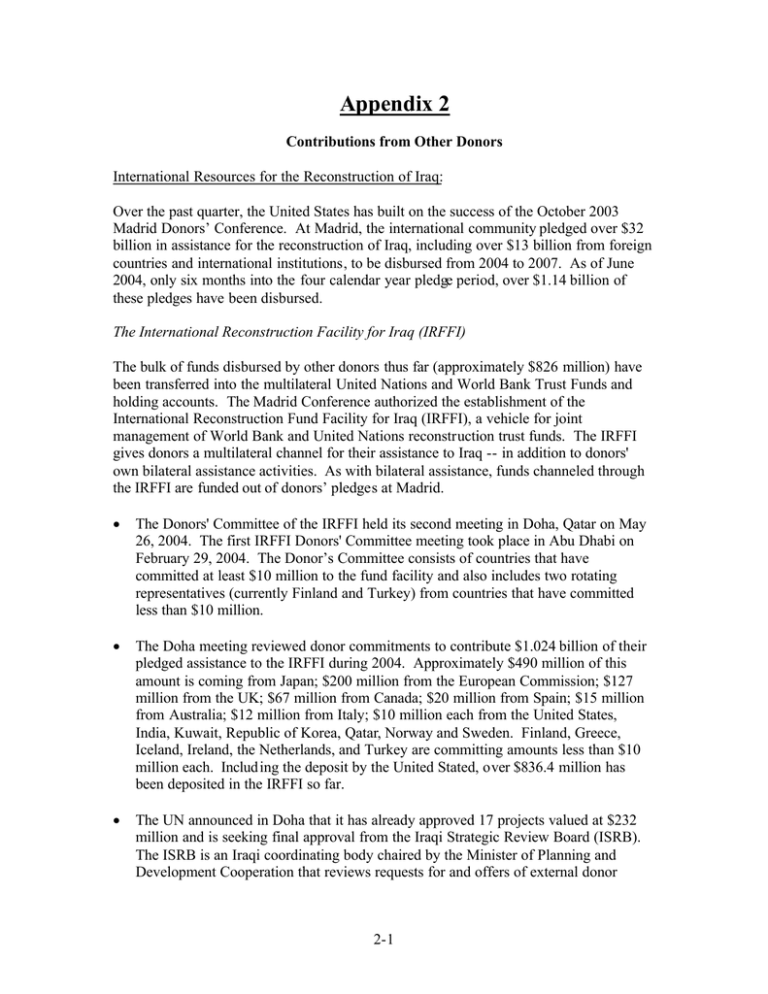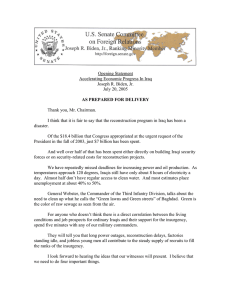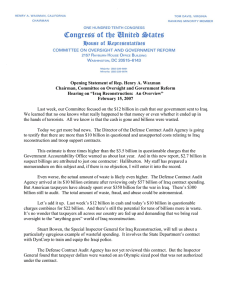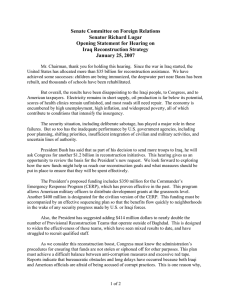Appendix 2
advertisement

Appendix 2 Contributions from Other Donors International Resources for the Reconstruction of Iraq: Over the past quarter, the United States has built on the success of the October 2003 Madrid Donors’ Conference. At Madrid, the international community pledged over $32 billion in assistance for the reconstruction of Iraq, including over $13 billion from foreign countries and international institutions, to be disbursed from 2004 to 2007. As of June 2004, only six months into the four calendar year pledge period, over $1.14 billion of these pledges have been disbursed. The International Reconstruction Facility for Iraq (IRFFI) The bulk of funds disbursed by other donors thus far (approximately $826 million) have been transferred into the multilateral United Nations and World Bank Trust Funds and holding accounts. The Madrid Conference authorized the establishment of the International Reconstruction Fund Facility for Iraq (IRFFI), a vehicle for joint management of World Bank and United Nations reconstruction trust funds. The IRFFI gives donors a multilateral channel for their assistance to Iraq -- in addition to donors' own bilateral assistance activities. As with bilateral assistance, funds channeled through the IRFFI are funded out of donors’ pledges at Madrid. • The Donors' Committee of the IRFFI held its second meeting in Doha, Qatar on May 26, 2004. The first IRFFI Donors' Committee meeting took place in Abu Dhabi on February 29, 2004. The Donor’s Committee consists of countries that have committed at least $10 million to the fund facility and also includes two rotating representatives (currently Finland and Turkey) from countries that have committed less than $10 million. • The Doha meeting reviewed donor commitments to contribute $1.024 billion of their pledged assistance to the IRFFI during 2004. Approximately $490 million of this amount is coming from Japan; $200 million from the European Commission; $127 million from the UK; $67 million from Canada; $20 million from Spain; $15 million from Australia; $12 million from Italy; $10 million each from the United States, India, Kuwait, Republic of Korea, Qatar, Norway and Sweden. Finland, Greece, Iceland, Ireland, the Netherlands, and Turkey are committing amounts less than $10 million each. Includ ing the deposit by the United Stated, over $836.4 million has been deposited in the IRFFI so far. • The UN announced in Doha that it has already approved 17 projects valued at $232 million and is seeking final approval from the Iraqi Strategic Review Board (ISRB). The ISRB is an Iraqi coordinating body chaired by the Minister of Planning and Development Cooperation that reviews requests for and offers of external donor 2-1 assistance. The World Bank said that it has recently signed a $40 million school textbook project with Iraq, and several other projects are close to approval. • Another Donors’ Committee meeting will be held in Tokyo in October 2004. • There were other important expressions of international support for Iraq's reconstruction. UN Security Council Resolution 1546, which was passed on June 8, 2004, cites "the importance of international assistance in the reconstruction and development of the Iraqi economy." The G-8 nations in their Sea Island Summit statement of June 9, 2004 issued a statement to "express our shared commitment, and urge others, to support the economic revitalization of Iraq, focusing on priority projects identified by the Interim Government. We welcome the success of the International Reconstruction Fund Facility donors' conference in Doha, and commit before the next conference in Tokyo later this year to identity how each of us can contribute to the reconstruction of Iraq." Updates on Selected Donors The January report to Congress included a table of pledges made at the Madrid International Donors Conference, held October 23-24, 2003. Since that report, donors have refined their plans for delivering and directing their pledged assistance, working with the list of priority projects presented at the Abu Dhabi and Doha meetings by the Iraqi Minister of Planning and Development (MoPDC). Several donors have provided additional information regarding their plans for implementation of their 2004 pledges. Japan Japan has pledged more assistance to Iraq than any country except the United States. Japan pledged over $1.5 billion in grant assistance aimed at immediate humanitarian and reconstruction needs, as well as more than $3.5 billion, primarily in concessional lending. In its past fiscal year (ending April 2004) Japan extended humanitarian aid exceeding $130 million to Iraq through such channels as direct assistance, international organizations, and non- governmental organizations (NGOs). As of June 29, 2004, Japan had already disbursed $615 million and allocated another $535 million of its pledge for a total of $1.15 billion. In the most recent group of these fund allocations, Japan announced on June 29 that it will rehabilitate three power stations ($160 million) and four general hospitals ($68 million), provide sanitation equipment ($57 million), and provide armored vehicles to the Ministry of Interior ($5 million). Among the funds already disbursed, Japan by May 25, 2004 had deposited a total of $450 million to the IRFFI, of which $360 million is for the fund administered by the United Nations and $90 million is for the fund administered by the World Bank. An additional $40 million will be provided to the World Bank’s IRFFI trust fund in the near future. Japan has also disbursed $10 million to the small business financial facility of the 2-2 International Finance Corporation (IFC). In addition, Japan has announced an allocation of $15.4 million to the United Nations Development Program to employ Iraqis for programs such as restoration of water and sewage systems, garbage collection, and sanitation. Japanese assistance is already making a difference on the ground in Iraq. Japanese assistance under way and planned spans a range of important projects, including: • 12 water tankers donated by Japan to be used by the city of Samawa in cooperation with Japan's Self Defense Forces, which are purifying about 70 tons of water a day. About 200,000 people in the vicinity will be provided with clean water. • Grant assistance for Japanese NGO projects to the Samawa Maternity and Children's Hospital, which have provided medical equipment, including infant incubators, photo therapy units for incubators, and electrocardiographs to the only children's and maternity hospital in Al-Muthanna Governorate. • Contributions to UNESCO, which are allowing capacity strengthening in the Ministry of Education and a recovery project for the restoration laboratory of the Iraqi National Museum to move ahead. • Donation of 1,150 police vehicles. • Donation of 70 fire trucks to Baghdad, Basra, and Muthanna. • Rehabilitation and equipping of four hospitals (Nasiriyah, Najaf, Diwaniyah, and Samawah) in southern Iraq and four more from allocated funds for northern Iraq (Kirkuk, Arbil, Mosul and Dahuk). • 27 mobile electricity substations. • 30 compact water treatment units in Baghdad. • Through HABITAT, assistance for rehabilitation of schools and housing and community facilities. The United Kingdom At Madrid, the UK pledged a total of $452 million for the Iraq reconstruction effort up until March 2006. This is in addition to the UK's earlier assistance for the humanitarian effort and its assessed portion of the European Commission's assistance. The UK has deposited over $127 million in the IRFFI ($71 million to the World Bank Trust Fund and $56 million to the UN Trust Fund). Further contributions to the IRFFI 2-3 from the UK's Madrid pledge will be considered depending on the effectiveness of its operations and its need for additional funding. The UK is also making a $15 million contribution to a small and medium size enterprise lending facility established by the World Bank's International Finance Corporation (IFC). In addition to its multilateral contributions, the UK is also implementing bilateral projects for reconstruction. It has already disbursed or allocated $89 million for projects that include governance and economic capacity building, rehabilitation of power, fuel, and water sectors in southern Iraq, and support to the justice sector and civil service. Spain Spain pledged $220 million in reconstruction assistance at the Donor Conference it hosted in Madrid, of which $60 million is for 2004. Out of this $60 million, Spain has committed $20 million to the World Bank trust fund within the IRFFI, as well as $5 million for the IFC small business facility. It also provided $18 million for the production of new Iraqi dinars and is still programming the remaining $17 million of its 2004 pledge. Since its recent change in government, Spain has reiterated its continued support for Iraqi reconstruction. Canada Canada pledged $187 million at Madrid. In the lead- up to hostilities, Canada provided the UN with $5.6 million for emergency preparedness, and in the immediate aftermath $42 million in urgent humanitarian relief was disbursed in response to the UN Humanitarian Appeal. Canada has deposited $44.7 million to the IRFFI, which was equally divided between the UN and the World Bank trust funds of the IRFFI, and committed to contribute $23 million more in the future. In addition, Canada has disbursed over $35 million in bilateral assistance. This includes $29 million to UNICEF and $3.7 million to CARE Canada for reconstruction work to improve basic services in water and sanitation, basic health and educ ation, and child protection. It has also disbursed $2 million to assist the “Marsh Arabs” and $0.5 million to UNDP for work on Iraqi governance. Canada has also allocated $7.3 million over two years for deployment of Canadian police instructors to assist in the training of Iraqi police at a multi- national police academy in Jordan. The first contingent of 20 trainers arrived in January. Canada's priorities for the remainder of its assistance includes: social and economic needs of Iraqis; good governance, in both Iraq and in the region; the promotion of human rights and gender equality; and helping to reconstitute an effective and responsible Iraq security sector. The European Commission (EC) 2-4 The EC pledged approximately $235 million at the Madrid Donors Conference. At the end of 2003, the EC provided $47 million for UN-implemented activities and $3 million to the World Bank for Iraqi capacity building training. In June 2004, the EC deposited $100 million in the World Bank portion of the IRFFI and $58.6 million in the UN portion. As set out in its Iraq Assistance Program adopted on March 4, 2004, the Commission's priorities for Iraq reconstruction in 2004 are: • Restoring and strengthening delivery of public services - $113 million to support the re-establishment of key public services – education, both primary and secondary; health, particularly children's immunization programs; and clean water and access to sanitation. • Livelihoods and poverty reduction - $75 million to support generation of immediate local employment, contribute to efforts to develop sustainable sources of income through the development of the private and agricultural sectors, and help create social safety net provisions. • Strengthened governance, civil society, human rights - $12 million, in part to channel support to the United Nations (UN) and World Bank to assist in the holding of elections, reforming the justice system, reinforcing civil society and a free media, and for assistance in good governance. Additional financing from EC bilateral democracy and human rights programs will compleme nt these initiatives. • On June 9, 2004, the European Commission set out in a report to the Council and the European Parliament its short- and medium- term strategy for relations between the European Union (EU) and Iraq. In the report, entitled The European Union and Iraq: A Framework for Engagement (http://europa.eu.int/external_relations/iraq/news/ip04_723.htm), the EC proposed a further $243 million EU contribution to Iraq's reconstruction in 2005 and expects that a similar amount could be required in 2006, subject to budgetary constraints and the ability to spend committed funds during 2005. Most of these funds would continue to be directed to the IRFFI, but a portion could be reserved for technical assistance programs and capacity building support. World Bank The World Bank is moving forward quickly on a number of programs as it receives funding into its trust fund under the IRFFI. As of the Doha meeting, $387.29 million had been committed by donors to the World Bank trust fund of the IRFFI. Of this, $313.1 million has been deposited to the trust fund or holding account. The Bank’s provisional strategy envisions the following operations: 2-5 Operation Emergency Education Emergency Community-Based Rural Infrastructure Emergency Infrastructure Reconstruction Projected Costs US $100 million US $100 million US $200 - 400 million Additional training addressing the environmental and social impact of development projects, infrastructure regulation, restructuring of state-owned enterprises, investment climate issues, and financial sector reform will take place over the next few months. The World Bank will also provide a range of policy advice, with lending operations potentially commencing in 2005. The World Bank reported at the IRFFI Doha Donor's Conference that it has recently signed a $40 million school textbook project with Iraq and several other projects are close to final approval. United Nations As of the Doha meeting, $585.9 million had been committed by donors to the UN trust fund of the IRFFI. Of this, $523.3 million has been deposited to the trust fund or holding account. The UN has engaged in a detailed process leading to a strategic planning framework for the next three years. The framework is organized along ten “clusters” with various UN specialized agencies working together under a cluster lead agency in each. Support and intervention within the clusters take the form of: • Advocacy, Policy and Regulation; • Capacity Building; • Information and Systems; • Mapping (or Diagnostics) and Assessments; • Awareness, Education and Communication; • Service Delivery; • Facilities and Capital Investment (including equipment, premises, etc.); and • Initiatives for sustainable job creation, based on “decent work” principles. The UN announced in Doha that it has already approved 17 projects valued at $232 million and is seeking final approval from the Iraqi Strategic Review Board. 2-6





